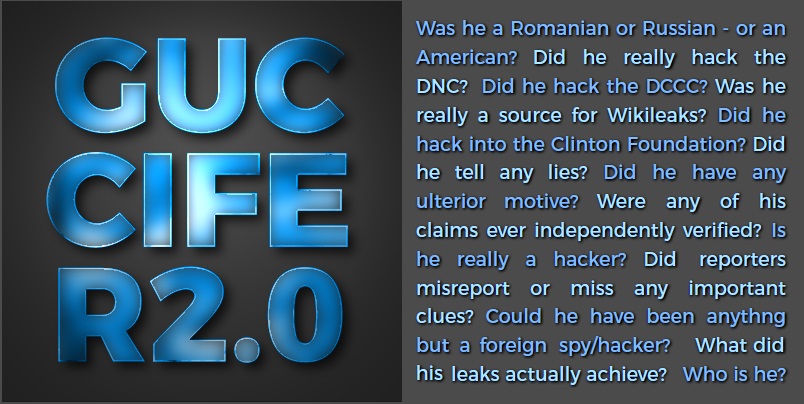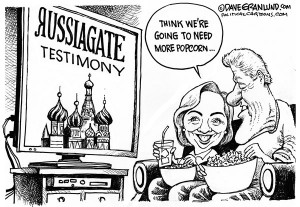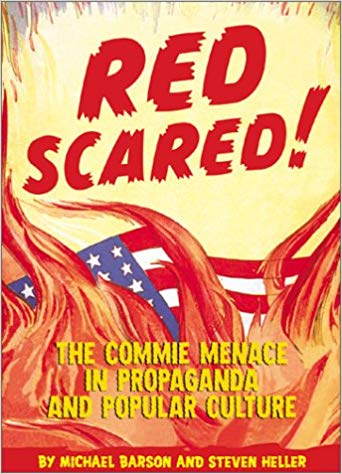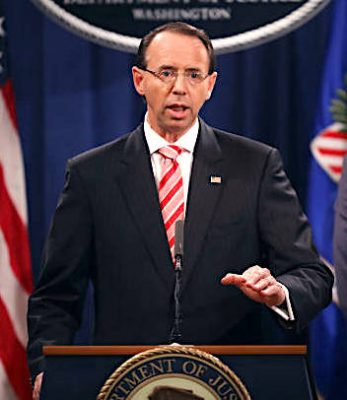“One year later, the VIPS memo contending that the DNC emails were leaked and not hacked has yet to be successfully challenged. Meanwhile, the country sinks deeper into the morass of the new McCarthyism”
A year has passed since highly credentialed intelligence professionals produced the first hard evidence that allegations of mail theft and other crimes attributed to Russia rested on purposeful falsification and subterfuge. The initial reaction to these revelations—a firestorm of frantic denial—augured ill, and the time since has fulfilled one’s worst expectations. One year later we live within an institutionalized proscription of proven reality. Our discourse consists of a series of fence posts and taboos. By any detached measure, this lands us in deep, serious trouble. The sprawl of what we call “Russia-gate” now brings our republic and its institutions to a moment of great peril—the gravest since the McCarthy years and possibly since the Civil War. No, I do not consider this hyperbole.
Much has happened since Veteran Intelligence Professionals for Sanity published its report on intrusions into the Democratic Party’s mail servers on Consortium News on July 24 last year. Parts of the intelligence apparatus—by no means all or even most of it—have issued official “assessments” of Russian culpability. Media have produced countless multi-part “investigations,” “special reports,” and what-have-yous that amount to an orgy of faulty syllogisms. Robert Mueller’s special investigation has issued two sets of indictments that, on scrutiny, prove as wanting in evidence as the notoriously flimsy intelligence “assessment” of January 6, 2017.
Indictments are not evidence and do not need to contain evidence. That is supposed to come out at trial, which is very unlikely to ever happen. Nevertheless, the corporate media has treated the indictments as convictions.
Numerous sets of sanctions against Russia, individual Russians, and Russian entities have been imposed on the basis of this great conjuring of assumption and presumption. The latest came last week, when the Trump administration announced measures in response to the alleged attempt to murder Sergei and Yulia Skripal, a former double agent and his daughter, in England last March. No evidence proving responsibility in the Skripal case has yet been produced. This amounts to our new standard. It prompted a reader with whom I am in regular contact to ask, “How far will we allow our government to escalate against others without proof of anything?”
This is a very good question.
There have been many attempts to discredit VIPS50 as the group’s document is called. There has been much amateurish journalism, false reporting, misrepresentation, distortion, misquotation, and omission. We have been treated to much shoddy science, attempts at character assassination, a great deal of base name-calling, and much else. Russia is routinely advanced as the greatest threat to democracy Americans now face. Is there any denying that we live amid an induced hysteria now comparable to the “Red under every bed” period of the 1950s?
None of this has altered the basic case. VIPS and forensic scientists working with it have continued their investigations. New facts, some of which alter conclusions drawn last year, have come to light, and these are to be addressed. But the basic evidence that Russia-gate is a false narrative concocted by various constituents of national power stands, difficult as this is to discern. Scrape back all that is ethically unacceptable and unscrupulously conveyed into the public sphere and you find that nothing has changed: No one “hacked” the Democratic party’s mail in the summer of 2016. It was leaked locally. From what one can make out, it was done to expose the party leadership’s corrupt efforts to sink Bernie Sanders’ insurgent campaign to win the Democratic nomination.
But in another, very profound way, more has changed since VIPS50 was published than one could have imagined a year ago. American discourse has descended to a dangerous level of irrationality. The most ordinary standards of evidentiary procedure are forgone. Many of our key institutions—the foreign policy apparatus, the media, key intelligence and law-enforcement agencies, the political leadership—are now extravagantly committed to a narrative none appears able to control. The risk of self-inflicted damage these institutions assume, should the truth of the Russia-gate events emerge—as one day it surely will—is nearly incalculable. This is what inspires my McCarthy and Civil War references. Russia-gate, in a phrase, has become too big to fail.
This column is an attack on no one. However it may be read, it is not intended as another round of vituperative argument adding to the din and fog we already suffer daily. No shred of ideology informs it. I write a lament—this for all we have done to ourselves and our institutions this past year, and to the prospect of an orderly world, and for all that must somehow be done to repair the damage once enough of us indeed recognize what has been done.
New VIPS Findings
Binney: Dares anyone to prove remote speeds.
The forensic scientists working with VIPS continued their research and experiments after VIPS50 was published. So have key members of the VIPS group, notably William Binney, the National Security Agency’s former technical director for global analysis and designer of programs the agency still uses to monitor internet traffic. Such work continues as we speak, indeed. This was always the intent: “Evidence to date” was the premise of VIPS50. Over the past year there have been confirmations of the original thesis and some surprises that alter secondary aspects of it. Let us look at the most significant of these findings.
At the time I reported on the findings of VIPS and associated forensic scientists, that the most fundamental evidence that the events of summer 2016 constituted a leak, not a hack, was the transfer rate—the speed at which data was copied. The speed proven then was an average of 22.7 megabytes per second. That speed matches what is standard when someone with physical access uses an external storage device to copy data from a computer or server and is much faster than a remote hack, reliant on communications topology available at the time, could achieve.
Binney experimented into the autumn. By mid-autumn he had tested several routes—from East Coast locations to cities in eastern Europe, from New Jersey to London. The fastest internet transfer speed achieved, during the New Jersey–to–Britain test, was 12.0 megabytes of data per second. Since this time it has emerged from G-2.0’s metadata that the detected average speed—the 22.7 megabytes per second—included peak speeds that ran as high as 49.1 megabytes per second, impossible over the internet. “You’d need a dedicated, leased, 400–megabit line all the way to Russia to achieve that result,” Binney said in a recent interview.
To my knowledge, no one with an understanding of the science involved, including various former skeptics, any longer questions the validity of the specific finding based on the observed transfer rate. That remains the bedrock evidence of the case VIPS and others advance without qualification. “No one—including the FBI, the CIA, and the NSA—has come out against this finding,” Binney said Monday. “Anyone who says the speed we demonstrated can be achieved remotely, our position is ‘Let’s see it. We’ll help any way we can.’ There hasn’t been anyone yet.”
There is also the question of where and when leaks were executed. Research into this has turned out differently.
 Evidence last year, based on analysis of the available metadata, showed that the copy operation date-stamped July 5, 2016, took place in the Eastern U.S. time zone. But Forensicator, one of the chief forensic investigators working on the mail-theft case anonymously, published evidence in May showing that while there was activity in the Eastern zone at the time of that copy, there was also a copy operation in the Pacific time zone, where clocks run three hours earlier that EST. In an earlier publication he had also reported activity in the Central time zone.
Evidence last year, based on analysis of the available metadata, showed that the copy operation date-stamped July 5, 2016, took place in the Eastern U.S. time zone. But Forensicator, one of the chief forensic investigators working on the mail-theft case anonymously, published evidence in May showing that while there was activity in the Eastern zone at the time of that copy, there was also a copy operation in the Pacific time zone, where clocks run three hours earlier that EST. In an earlier publication he had also reported activity in the Central time zone.
Plainly, more was awaiting discovery as to the when and where of the copy operations. The identity of Guccifer 2.0, who claimed to be a Romanian hacker but which the latest Mueller indictment claims is a construct of the GRU, Russian military intelligence, has never been proven. The question is what G–2.0 did with or to the data in question. It turns out that both more, and less, is known about G–2.0 than was thought to have been previously demonstrated. This work has been completed only recently. It was done by Binney in collaboration with Duncan Campbell, a British journalist who has followed the Russia-gate question closely.
Peak Speed Established
Binney visited Campbell in Brighton, England, early this past spring. They examined all the metadata associated with the files G–2.0 has made public. They looked at the number of files, the size of each, and the time stamps at the end of each. It was at this time that Binney and Campbell established the peak transfer rate at 49.1 megabytes per second.
But they discovered something else of significance, too. At some point G–2.0 had merged two sets of data, one dated July 5, 2016, which had been known, and another dated the following September 1, which had not been known. In essence, Campbell reverse-engineered G–2.0’s work: He took the sets of data G–2.0 presented as two and combined them back into one. “G–2.0 used an algorithm to make a downloaded file look like two files,” Binney explained. “Those two shuffled back together like a deck of cards.”
G–2.0 then took another step. Running another algorithm, he changed all the dates on all the files. With yet another algorithm, he changed the hours stamped on each file. These are called “range changes” among the professionals. The conclusion was then obvious: G–2.0 is a fabrication and a fabricator. Forensicator had already proven that the G–2.0 entity had inserted Russian “fingerprints” into the document known as the “Trump Opposition Report,” which G-2.0 had published on June 15, 2016. It is clear that no firm conclusions can be drawn at this point as to when or where G–2.0 did what he did.
“Now you need to prove everything you might think about him,” Binney told me. “We have no way of knowing anything about him or what he has done, apart from manipulating the files. We detected activity in the Eastern time zone. Now we have to ask again, ‘Which time zone?’ The West Coast copy operation [discovered by Forensicator] has to be proven. All the data has been manipulated. It’s a fabrication.”
This throws various things into question. The conclusions initially drawn on time and location in VIPS50 are now subject to these recent discoveries. “In retrospect, giving ‘equal importance’ status to data pertaining to the locale was mistaken,” Ray McGovern, a prominent VIPS member, wrote in a recent note. “The key finding on transfer speed always dwarfed it in importance.”
The indictments against 12 Russian intelligence officers announced in mid–July by Rod Rosenstein, the deputy attorney-general, also come into question. They rest in considerable part on evidence derived from G–2.0 and DCLeaks, another online persona. How credible are those indictments in view of what is now known about G–2.0?
Binney told me: “Once we proved G–2.0 is a fabrication and a manipulator, the timing and location questions couldn’t be answered but really didn’t matter. I don’t right now see a way of absolutely proving either time or location. But this doesn’t change anything. We know what we know: The intrusion into the Democratic National Committee mail was a local download—wherever ‘local’ is.” That doesn’t change. As to Rosenstein, he’ll have a lot to prove.”
What Role does Evidence Play?
Rosenstein’s predicament—and there is no indication he understands it as one—brings us to an essential problem: What is the place of evidence in American public discourse? Of rational exchange?
The questions are germane far beyond the Russia-gate phenomenon, but it is there that answers are most urgent. What is implicit in the Rosenstein indictments has been evident everywhere in our public sphere for a year or more: Make a presumption supported by circumstantial evidence or none and build other presumptions upon it until a false narrative is constructed. The press has deployed this device for as long as I have been a practitioner: “Might” or “could” or “possibly” becomes “perhaps,” “probably” and “almost certainly,” and then moves on to unqualified fact in the course of, maybe, several weeks. Now this is how our most basic institutions—not least agencies of the Justice Department—routinely operate.
This is what I mean when I refer to ours as a republic in peril.
There is the argument that certain things have been uncovered over the past year, and these are enough to conclude that Russia plots to undermine our democracy. I refer to the small number of Facebook advertisements attributed to Russians, to strings of Twitter messages, to various phishing exercises that occur thousands of times a day the world over. To be clear, I am no more satisfied with the evidence of Russian involvement in these cases than I am with the evidence in any other aspect of the Russia-gate case. But for the sake of argument, let us say it is all true.
 Does this line up with the Russophobic hysteria—not too strong a term—that envelops us? Does this explain the astonishing investments our public institutions, the press, and leading political parties have made in advancing this hysteria as they did a variant of in the 1950s?
Does this line up with the Russophobic hysteria—not too strong a term—that envelops us? Does this explain the astonishing investments our public institutions, the press, and leading political parties have made in advancing this hysteria as they did a variant of in the 1950s?
As global politics go, some serious thought should be given to a reality we have created all by ourselves: It is now likely that America has built a new Cold War division with Russia that will prove permanent for the next 20 to 30 years. All this because of some Facebook ads and Twitter threads of unproven origin? Am I the only one who sees a weird and worrisome gap between what we are intent on believing—as against thinking or knowing—and the consequences of these beliefs?
There was an orthodoxy abroad many centuries ago called Fideism. In the simplest terms, it means the privileging of faith and belief over reason. It was the enemy of individual conscience, among much else. Fideism has deep roots, but it was well around in the 16th century, when Montaigne and others had to navigate its many dangers. Closer to our time, William James landed a variant on American shores with an 1896 address called “The Will to Believe.” Bertrand Russell countered this line of thinking a couple of decades later with “Free Thought and Official Propaganda,” a lecture whose title I will let speak for itself. Twenty years ago, none other than Pope John Paul II warned of a resurgence of Fideism. It is still around, in short.
Do we suffer from it? A variant of it, I would say, if not precisely in name. There seems to be a givenness to it in the American character. I think we are staring into a 21st century rendition of it.
To doubt the hollowed-out myth of American innocence is a grave sin against the faith. It is now unpatriotic to question the Russia-gate narrative despite the absence of evidence to support it. Informal censorship of differing perspectives is perfectly routine. It is now considered treasonous to question the word of intelligence agencies and the officials who lead them despite long records of deceit. Do we forget that it was only 15 years ago that these same institutions and people deceived us into an invasion of Iraq the consequences of which still persist?
This was the question Craig Murray, the former British diplomat (who has vital information on the DNC mail theft but who has never been interviewed by American investigators) posed a few weeks ago. Eugene Robinson gave a good-enough reply in a Washington Post opinion piece shortly afterward: “God Bless the Deep State,” the headline read.
How we got here deserves a work of social psychology, and I hope someone takes up the task. Understanding our path into our self-created crisis seems to me the first step to finding our way out of it.










